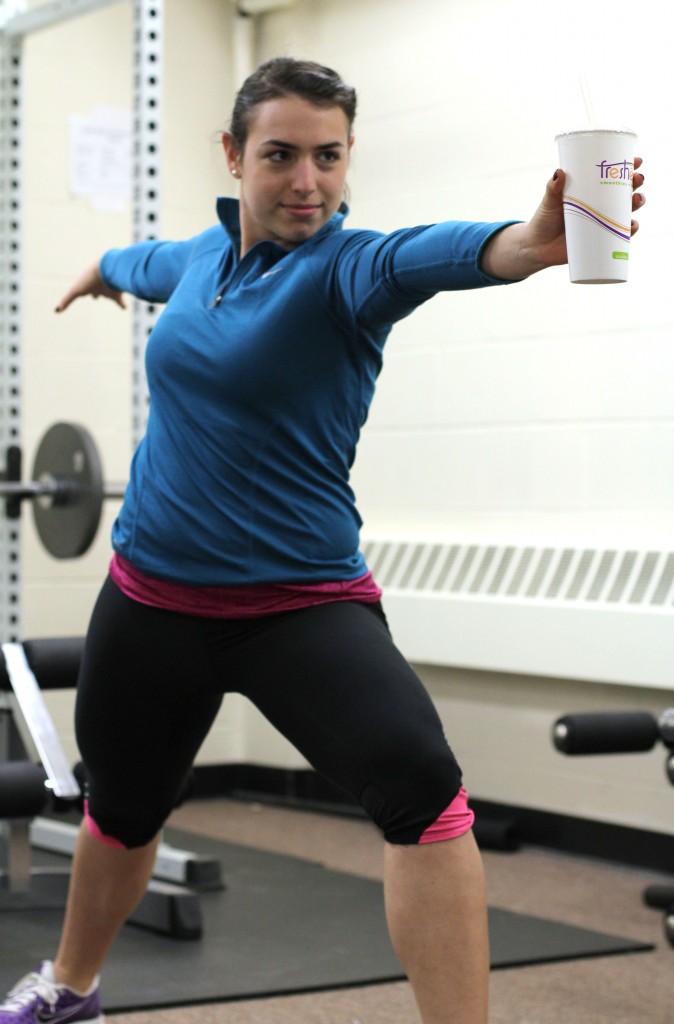
Living a healthy lifestyle can be tough, especially in college. All the drinking and fast food can really do a number on your waistline. But healthy living may be easier than you think, that is if you have your facts straight. Here are some common health food misconceptions.
1. All smoothies are healthy
You may pat yourself on the back for getting that smoothie instead of an ice cream cone at the Nite Owl, but it may not be the healthiest decision. A smoothie can contain as many calories as a meal, especially if it’s made with frozen yogurt, ice cream or sherbet.
Smoothies are also very high in sugar content. An original size Banana Berry smoothie from Jamba Juice contains 82 grams of sugar. That’s more than double your recommended 40 grams of sugar a day.
2. Carbs are bad
Many people who want to lose weight will avoid eating any starch whatsoever. After all, that’s what made the Atkins Diet so popular. While it’s not a good idea to eat carbohydrates in excess, they are an essential part of your diet. Take a cue from the South Beach Diet — a spinoff of Atkins — and try to eat good carbs, such as whole grain bread, pasta and brown rice.
Carbs are fuel for your body. Eat enough to keep your body going for the day, but not so much that they’ll be stored and lead to weight gain.
3. Nuts are not your friend
Nuts have a bad rep for being unhealthy because they are high in fat content. But nuts are actually a very good snack, as they contain many essential daily vitamins, like Vitamin E. Plus, while nuts are high in fat, they’re high in monounsaturated and polyunsaturated fats, or the “good fats.” It’s saturated and trans fats that you should avoid. Nuts can also help lower bad cholesterol and increase good cholesterol.
“I like to eat almonds with cheese because it’s healthy but also filling,” said Madeleine Manbeck, a junior double-majoring in history and political science. “The protein from the almonds keeps me full so I don’t continue to snack.”
4. Never eat junk
The key with any diet is moderation. While fast food, sweets and other junk food isn’t good for you, it is good to treat yourself once in a while.
“Junk food really doesn’t give your body any nutritious benefits,” said Eileen LePage, a nutrition teaching assistant and a senior majoring in biology. “A person should always opt for healthier selections. If you are going to eat junk food, make sure to pay attention to the serving size.”
Don’t overload on these foods, but life is about indulging occasionally.
5. Negative calories
There have been rumors that eating certain types of vegetables — like carrots and celery — will result in negative calories. The truth of the matter is you don’t burn more calories chewing celery than you gain. Veggies are still a healthy choice, just not a negative calorie choice.
6. Six meals are better than three
While it’s good to eat mini-meals throughout the day to keep your metabolism going, not everyone has the time to portion out all these meals. Plus, six small meals can turn into six large meals if you’re not careful about what you eat. Whether it’s small meals throughout the day or three meals a day, it doesn’t matter as long as you stay true to your body’s daily caloric intake.
7. Fresh fruit is best
Fresh fruit is great for you, but dried fruit can be just as good, and it’s easier to eat five portions of dried fruit — about one teaspoon per serving — than five servings of fresh fruit. The only huge benefit of fresh fruit is its abundance of Vitamin C.
8. Fat free means no calories
Fat free is exactly what it says — it’s free of fat. It does not mean there are fewer calories or that it’s calorie-free. Too much fat in any diet isn’t good, but cutting calories, not fat, is what matters when losing weight.
Plus, many times people will consume a lot more fat-free calories because they think it’s better for you than the full-fat options. Just be wary of these products and make sure to read the labels.
9. Salad is always the healthy option
The veggies in salad are good for you, but when you begin to add heavy dressings, like ranch, and tons of croutons, the salad becomes a little less healthy. Also, certain types of lettuce are better for you. If you have the choice, opt for spinach or romaine lettuce, as they contain the most nutrients. Iceberg lettuce, which is what most restaurants serve, and the fancy lettuce with mixed veggies in it are mostly made up of water and therefore do not have as much nutritional value.
Even though a salad may be listed as a healthy option on a fast food menu, you may be getting duped. According to “The Consumerist,” many fast food salads are high in fat, sugar, sodium and carbs. Some salads, like Wendy’s Garden Sensation’s Chicken Salad, have more calories than sandwiches on the menu. This seemingly healthy choice may be a health food disaster.
10. Protein, protein, protein
For those guys out there trying to bulk up, you may think you need to consume mass amounts of protein to enhance your muscles. However, according to the Mayo Clinic, only 35 percent of our daily diet should be protein.
While consuming protein is important for those trying to build muscle, eating exorbitant amounts will have little to no effect on muscle growth. Eat your daily serving of protein and work out from there.


